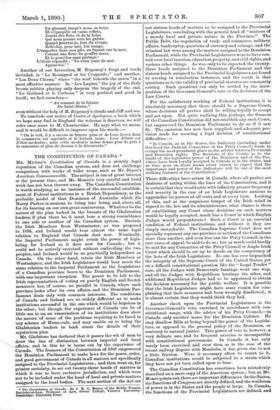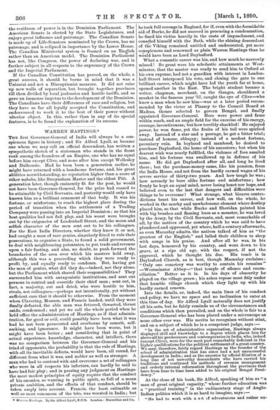THE CONSTITUTION OF CANADA.* Mn. MuNno's Constitution of Canada is
a strictly legal exposition of the Canadian system, and does not challenge comparison with works of wider scope, such as Mr. Bryce's American Commonwealth. The subject is one of great interest at the present time, and Mr. Munro's very careful and lucid work has not been thrown away. The Canadian Constitution is worth studying, as an instance of the successful establish- ment of Federal institutions in a British Dependency, as the probable model of that Dominion of Australia which Sir Harry Parkes is anxious to bring into being, and, above all, for its bearing on our own great controversy. Whatever be the nature of the plan locked, in the breasts of the Gladstonian leaders, if plan there be, it must bear a strong resemblance to one side or another of the Canadian system. Exclude the Irish Members from Westminster, as was proposed in 1886, and Ireland would bear almost the same legal relation to England that Canada does now. Nominally, the Imperial Parliament might retain the power of legis- lating for Ireland as it does now for Canada ; but it could not be actively exercised without embroiling the two peoples, and Ireland would be as practically independent as Canada On the other hand, retain the Irish Members at Westminster, and the Irish Legislature would bear much the same relation to the Imperial Parliament as the Legislature of a Canadian province bears to the Dominion Parliament, with one important exception. The power to be left to the Irish representatives of voting on purely English and Scotch measures has, of course, no parallel in Canada, where each province looks after its own affairs, and the Dominion Par- liament deals only with common interests. The conditions of Canada and Ireland are so widely different as to make institutions successful in the one which would be hopeless in the other; but though the experience of Canada can be of little use to us, an examination of its institutions does show the nature of some of the problems requiring to be faced in any scheme of Home-rule, and may enable us to bring the Gladstonian leaders to book about the details of their mysterious plan. Mr. Gladstone has declared that it passes the wit of man to -, draw the line of distinction between imperial and local
""-- in
affairs, and this he is borne out by the experience of
o nada. The framers of the Constitution of 1869 empowered tht Dominion Parliament to make laws for the peace, order, and good government of Canada in all matters not specifically assigned to the Provincial Legislatures ; and then went on, for gieater certainty, to set out twenty-three heads of matters in which it was to have exclusive jurisdiction, and which were not to be included under the head of local and private matters assigned to the local bodies. The next section of the Act set • The Constitution of Canada. By J. B. C. Munro, of the Middle Temple. Barrister-at-Law, Professor of Law, Owens College, Victoria University. Cambridge; University Press.
out sixteen heads of matters to be assigned to the Provincial Legislatures, concluding with the general head of "matters of a merely local and private nature in the Province." The Public Debt, the regulation of trade and commerce, military affairs, bankruptcy, questions of currency and coinage, and the criminal law were among the matters assigned to the Dominion Parliament, while the Provincial Legislatures were to have con- trol over local taxation, education, property, and civil rights, and various other things. As was only to be expected, the twenty- three heads assigned to the Dominion Parliament and the sixteen heads assigned to the Provincial Legislatures are found to overlap in numberless instances, and the result is that questions as to the validity of provincial statutes are constantly arising. Such questions can only be settled by the inter- position of the Governor-General's veto or the decisions of the Law Courts.
For the satisfactory working of Federal institutions, it is absolutely necessary that there should be a Supreme Court, whose decisions all parties shall be willing loyally to accept and act upon. Not quite realising this, perhaps, the framers of the Canadian Constitution did not establish any such Court, but empowered the Dominion Parliament to do so, if it saw fit. The omission has now been supplied, and adequate pro- vision made for securing a legal decision of constitutional difficulties :—
"In Canada, as in the States, the Judiciary (including under this head the Judicial Committee of the Privy Council) tends to occupy the most prominent place as the arbiter between Provincial and Dominion rights. The decisions of the Courts as to the limits of the legislative power of the Dominion and of the Pro- vinces have been loyally accepted in Canada as in the States, and as time goes on, there seems every reason to expect that the importance and power of the judicature will be one of the most striking features of the Constitution."
These difficulties have arisen in Canada, where all parties are desirous of acting within the lines of the Constitution, and it is certain that they would arise with infinitely greater frequency and severity in the case of an Irish Legislature anxious to aggrandise its powers at all costs and at every turn. Looking at this, and at the suspicious temper of the Irish mind in regard to the law and its administrators, what chance is there of establishing any Court whose decisions on such matters would be loyally accepted, much less a Court in which English Judges would preponderate? Such a Court is an essential condition of Federal institutions, and without it they are simply unworkable. The Canadian Supreme Court does not specially represent any one province or section of the Canadians more than another, and even less can the Privy Council, in the rare cases of appeal, be said to do so; but as much could hardly be said for any Committee of the Privy Council or Anglo-Irish Court which should be set up to decide on the competency of the Acts of the Irish Legislature. No one has ever impeached the integrity of the Supreme Court of the United States, yet on a difficult constitutional question like the "Legal Tender" case, all the Judges with Democratic leanings went one way, and all the Judges with Republican leanings the other, and additional Republican Judges had to be appointed to obtain the decision necessary for the public welfare. It is possible that the Irish Legislature might have some reason for com- plaining that their measures had been wrongly disallowed; it is almost certain that they would think they had.
Another check upon the Provincial Legislatures is the Governor-General's veto, exercised in accordance with con- stitutional usage, with the advice of his Privy Council,—in Canada only another name for the Dominion Cabinet. He may disallow Bills as being beyond the power of the Legisla- ture, or opposed to the general policy of the Dominion, or contrary to natural justice. This power of veto is, however, a very delicate one, and its frequent exercise is incompatible with constitutional government. In Canada it has only rarely been exercised, and even then, as in the case of the recent railway dispute with Manitoba, it has given rise to not a little friction. Were it necessary often to resort to it, Canadian institutions would be subjected to a strain which they have not yet been called upon to bear.
The Canadian Constitution has sometimes been mistakenly described as a mere copy of the American system; but, as Mr. Monro points oat, there are important differences. In the States, the functions of Congress are strictly defined, and the residuum of power is in the States and the people at large. In Canada, the functions of the Provincial Legislatures are defined, and
the residuum of power is in the Dominion Parliament. The American Senate is elected by the State Legislatures, and enjoys great influence and patronage. The Canadian Senate is made up of Life-Senators nominated by the Crown, has no patronage, and is eclipsed in importance by the Lower House. The Canadian Ministerial system is framed on an English rather than an American model. The Dominion Parlianient has not, like Congress, the power of declaring war, and is further subject in all respects to the supremacy of the Crown and the Imperial Parliament.
If the Canadian Constitution has proved, on the whole, a great success, it should be borne in mind that it was a Unionist and not a Disruptionist measure. It did not raise up new walls of separation, but brought together provinces till then divided by local jealousies and hostile tariffs, and so gave an immense impetus to the development of the Dominion. The Canadians have their differences of race and religion, but they have so far all loyally accepted the Constitution, and endeavoured to work it to the best of their power without ulterior object. In this, rather than in any of its special features, is to be found the explanation of its success.







































 Previous page
Previous page